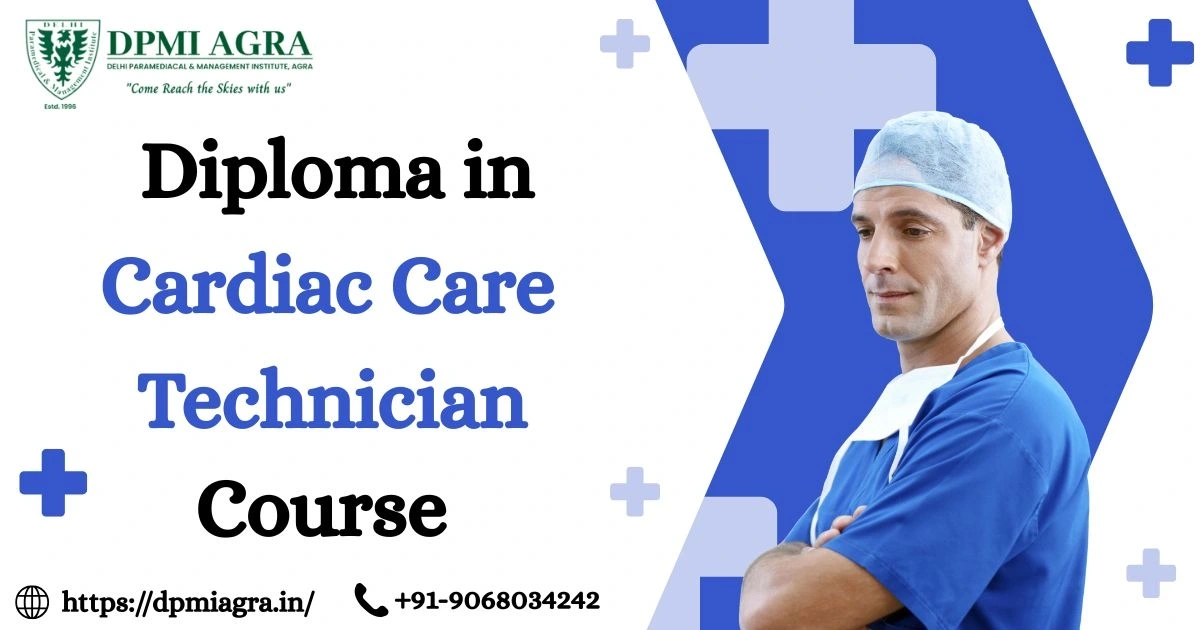Diploma in Cardiac Care Technology | Cardiac Care Technician Course
When someone is rushed to the hospital with chest pain, it’s not just doctors who make a difference—Cardiac Care Technicians play a crucial role in saving lives. They are the behind-the-scenes professionals who assist doctors in diagnosing and treating heart-related conditions. If you’ve ever dreamed of working in a healthcare field where every decision and action matters, then a Diploma in Cardiac Care Technology could be the perfect course for you. At DPMI Agra, students are trained to become skilled professionals who can support cardiologists in cath labs, ICUs, and emergency rooms.
What is a Diploma in Cardiac Care Technology?
The Diploma in Cardiac Care Technology is a specialized paramedical course designed to prepare students for a career in cardiology support services. It focuses on practical knowledge of how the human heart works, diagnostic tests, and advanced equipment like ECG, echocardiography, and catheterization labs.
During this course, students learn:
- Fundamentals of cardiac anatomy and physiology.
- Use of medical equipment like ECG machines, defibrillators, and Holter monitors.
- Patient monitoring before and after cardiac procedures.
- Emergency management of patients suffering from heart attacks and strokes.
If you’ve ever wondered about the Cath Lab Technician meaning, it refers to the professionals trained to assist cardiologists in catheterization labs, where life-saving procedures like angiography and angioplasty are performed.
Why Choose a Career as a Cardiac Care Technician?
Choosing to become a Cardiac Care Technician is more than just a career it’s a calling. With cardiovascular diseases rising at an alarming rate, there’s a growing demand for qualified cardiac technologists across hospitals, diagnostic centers, and emergency care units. Here are some compelling reasons to pursue this career path:
- High Demand: India sees millions of cardiac patients every year, creating a constant demand for skilled cardiac care technologists.
- Job Stability: Unlike some careers that fluctuate with market trends, healthcare remains stable.
- Respect & Impact: Working in healthcare allows you to directly contribute to saving lives.
- Growth Opportunities: After a diploma, students can upgrade with advanced certifications or pursue a bachelor’s degree.
Interestingly, when comparing Paramedical vs Nursing, paramedical professionals like cardiac technologists often work more closely with advanced medical equipment and assist in specialized procedures, while nurses are more patient-care focused.
Course Structure: What You’ll Learn in Cardiac Care Technician Course
At DPMI Agra, the Cardiac Care Technician Course is designed to blend theory with practice. The syllabus usually covers:
- Core Subjects
- Anatomy & Physiology of the Heart
- Pathology of Cardiovascular Diseases
- Basics of Pharmacology
- Electrocardiography (ECG)
- Anatomy & Physiology of the Heart
- Practical Training
- Handling emergency equipment
- Training in cath labs and ICUs
- Performing ECG, TMT (Treadmill Test), and Holter monitoring
- Handling emergency equipment
- Internship/Clinical Exposure
- Hands-on training under cardiologists
- Exposure to real-time cases
- Managing pre- and post-operative care
- Hands-on training under cardiologists
By the end of the program, students not only earn a Cardiac Care Technician certificate but also gain real-world confidence to step into healthcare roles.
Eligibility & Admission Process
If you’re planning to enroll in the Diploma in Cardiac Care Technology, here’s what you need to know:
- Educational Requirement: Students must have completed 10+2 with science subjects (Physics, Chemistry, Biology).
- Duration: Generally 2 years, including theory and internship.
- Age Limit: Most institutions accept students between 17–30 years.
- Admission Process: Admission at DPMI Agra is merit-based and involves a simple counseling session.
Some students also ask, “Can arts student do DMLT course, BSc Nursing or Paramedical?” While arts students cannot directly pursue a diploma in cardiac care (since it requires a science background), there are other paramedical certificate programs they can explore.
Career Opportunities After Diploma in Cardiac Care Technology
After completing this diploma, students can work in:
- Government & Private Hospitals
- Diagnostic Centers
- Rehabilitation Clinics
- ICU & Emergency Care Units
- Cardiac Research Centers
Common job titles include:
- Cardiac Care Technician
- Cath Lab Technician
- ECG Technician
- Cardiac Care Technologist
To highlight scope, here’s a quick career comparison table:
| Career Path | Qualification Needed | Average Salary (INR) | Work Environment |
| Cardiac Care Technician | Diploma in Cardiac Care Tech | 3–5 LPA | Hospitals, Cath Labs |
| Nurse | B.Sc Nursing/GNM | 2.5–4.5 LPA | Hospitals, Clinics |
| Lab Technician (BMLT/DMLT) | Diploma/B.Sc Lab Technology | 2–4 LPA | Pathology Labs, Clinics |
This is why many students search for the Difference Between BMLT and DMLT before deciding which healthcare career suits them best.
Conclusion
A career as a Cardiac Care Technician is both rewarding and impactful. With the rising number of heart patients, the demand for skilled professionals is only going to increase. By enrolling in the Diploma in Cardiac Care Technology at DPMI Agra, you can open doors to a fulfilling career where you directly contribute to saving lives. Whether it’s working in cath labs, ICUs, or diagnostic centers, this diploma equips you with the skills and confidence needed to succeed in the healthcare sector.
FAQs
Q. What is the duration of the Diploma in Cardiac Care Technology?
Ans. The course typically takes 2 years, including both theory and practical training.
Q. What are the job opportunities after completing this diploma?
Ans. You can work as a Cardiac Care Technician, Cath Lab Technician, ECG Technician, or Cardiac Care Technologist in hospitals and clinics.
Q. What is the Cath Lab Technician meaning?
Ans. A Cath Lab Technician assists cardiologists in procedures like angiography, angioplasty, and other cardiac interventions.
Q. Can I pursue this course if I am from the arts stream?
Ans. No, science (PCB) in 10+2 is required. Arts students can opt for other paramedical courses.
Q. What is the salary of a Cardiac Care Technician in India?
Ans. On average, freshers earn between INR 3–5 LPA, with scope for higher pay after experience.

